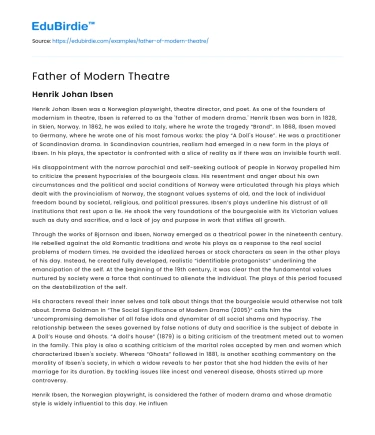Henrik Johan Ibsen
Henrik Johan Ibsen was a Norwegian playwright, theatre director, and poet. As one of the founders of modernism in theatre, Ibsen is referred to as the 'father of modern drama.' Henrik Ibsen was born in 1828, in Skien, Norway. In 1862, he was exiled to Italy, where he wrote the tragedy “Brand”. In 1868, Ibsen moved to Germany, where he wrote one of his most famous works: the play “A Doll's House”. He was a practitioner of Scandinavian drama. In Scandinavian countries, realism had emerged in a new form in the plays of Ibsen. In his plays, the spectator is confronted with a slice of reality as if there was an invisible fourth wall.
His disappointment with the narrow parochial and self-seeking outlook of people in Norway propelled him to criticize the present hypocrisies of the bourgeois class. His resentment and anger about his own circumstances and the political and social conditions of Norway were articulated through his plays which dealt with the provincialism of Norway, the stagnant values systems of old, and the lack of individual freedom bound by societal, religious, and political pressures. Ibsen’s plays underline his distrust of all institutions that rest upon a lie. He shook the very foundations of the bourgeoisie with its Victorian values such as duty and sacrifice, and a lack of joy and purpose in work that stifles all growth.
Save your time!
We can take care of your essay
- Proper editing and formatting
- Free revision, title page, and bibliography
- Flexible prices and money-back guarantee
Through the works of Bjornson and Ibsen, Norway emerged as a theatrical power in the nineteenth century. He rebelled against the old Romantic traditions and wrote his plays as a response to the real social problems of modern times. He avoided the idealized heroes or stock characters as seen in the other plays of his day. Instead, he created fully developed, realistic “identifiable protagonists” underlining the emancipation of the self. At the beginning of the 19th century, it was clear that the fundamental values nurtured by society were a farce that continued to alienate the individual. The plays of this period focused on the destabilization of the self.
His characters reveal their inner selves and talk about things that the bourgeoisie would otherwise not talk about. Emma Goldman in “The Social Significance of Modern Drama (2005)” calls him the ‘uncompromising demolisher of all false idols and dynamiter of all social shams and hypocrisy. The relationship between the sexes governed by false notions of duty and sacrifice is the subject of debate in A Doll’s House and Ghosts. “A doll’s house” (1879) is a biting criticism of the treatment meted out to women in the family. This play is also a scathing criticism of the marital roles accepted by men and women which characterized Ibsen's society. Whereas “Ghosts” followed in 1881, is another scathing commentary on the morality of Ibsen's society, in which a widow reveals to her pastor that she had hidden the evils of her marriage for its duration. By tackling issues like incest and venereal disease, Ghosts stirred up more controversy.
Henrik Ibsen, the Norwegian playwright, is considered the father of modern drama and whose dramatic style is widely influential to this day. He influenced modern English playwrights like George Bernard Shaw, Stanley Houghton, and others. Ibsen's A Doll's House is one of the best emblematic examples of realistic plays in which Nora, the female protagonist, decides to leave her husband and walk away from her family at the end of the play.






 Stuck on your essay?
Stuck on your essay?

